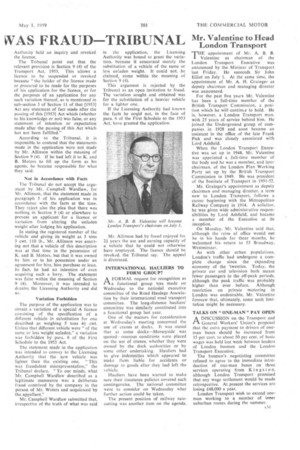WAS FRAUD-TRIBUNAL
Page 33

If you've noticed an error in this article please click here to report it so we can fix it.
Authority held an inquiry and revoked the licence,
The Tribunal point out that the relevant provision is Section 9 (4) of the Transport Act, 1953. This allows a licence to be suspended or revoked because "the holder of the licence made or procured to be made for the purposes of his application for the licence, or for the purposes of an application for any such variation thereof, as is mentioned in sub-section 3 of Section 11 of that [1953] Act any statement of fact made after the passing of this [1953] Act which (whether to his knowledge or not) was false, or any statement of intention or expectation made after the passing of this Act which has not been fulfilled."
According to the Tribunal, it is impossible to contend that the statements made in the application were not made by Mr. Allinson within the meaning of Section 9 (4). If he had left it to K. and B. Motors to fill up the form is his agents, he became responsible for what they said.
Not in Accordance with Facts The Tribunal do not accept the argument by Mr. Campbell Wardlaw, for Mr. Allinson, that the statement made in paragraph 5 of his application was in accordance with the facts at the time. They reject also the plea that there was nothing in Section 9 (4) or elsewhere to prevent an applicant for a licence or variation from altering the unladen weight after lodging his application.
In stating the registered number of the vehicle and giving its weight as 5 tons 3 cwt. 110 lb., Mr. Allinson was asserting not that a vehicle of this description was at that time in the possession of K. and B. Motors, but that it was owned by him or in his possession under an agreement for hire, hire purchase or loan. In fact, he had no intention of even acquiring such a lorry. The statement was false within the meaning of Section 9 (4). Moreover, it was intended to deceive the Licensing Authority and did so.
Variation Forbidden The purpose of the application was to obtain a variation of a special A licence consisting of the specification of a different vehicle in substitution for one described as weighing 5 tons 4+ cwt. Unless that different vehicle were "of the same or less weight unladen," a variation was forbidden by para. 6 of the First Schedule to the 1953 Act.
The statement made in the application was intended to convey to the Licensing Authority that the new vehicle was lighter than the existing one. "This was fraudulent misrepresentation," the Tribunal declare. "To our minds, what Mr. Campbell Wardlaw described as a legitimate manoeuvre was a deliberate fraud contrived by the company in the person of Mr. Waters and acquiesced by the appellant."
Mr. Campbell Wardlaw submitted that, irrespective of the truth of what was said in the application, the Licensing Authority was bound to grant the variation, because it concerned merely the substitution of a vehicle of the same or legs unladen weight. It could not, he claimed, come within the meaning of Section 9 (4), This argument is rejected by the Tribunal as an open invitation to fraud. The variation sought and obtained was for the substitution of a heavier vehicle for a lighter one.
If the Licensing Authority had known the facts he could not, in the face of para. 6 of the First Schedule to the 1953 Act, have granted the application.
Mr. Allinson had by fraud enjoyed for 21 years the use and earning capacity of a vehicle that he could not otherwise have employed. The licence should be revoked, the Tribunal say, The appeal is dismissed.
INTERNATIONAL HAULIERS TO FORM GROUP?
AFORMAL request for recognition as a functional group was made on Wednesday to the natiorial executive committee of the Road Haulage Association by their international road transport committee. The long-distance hauliers' committee was similarly constituted into a functional group last year.
One of the matters for consideration at Wednesday's meeting concerned the use of cranes at docks. It was stated that at some docks—Merseyside was quoted—onerous conditions were placed on the use of cranes, whether they were owned by the dock authorities or by some other undertaking. Hauliers had to give indemnities which appeared to make them liable for accidents or damage to goods after they had left the vehicle.
Hauliers have been warned to make sure their insurance policies covered such contingencies. The national committee were to consider on Wednesday what further action could be taken.
The present position of railway ratecutting was another item on the agenda.




































































































